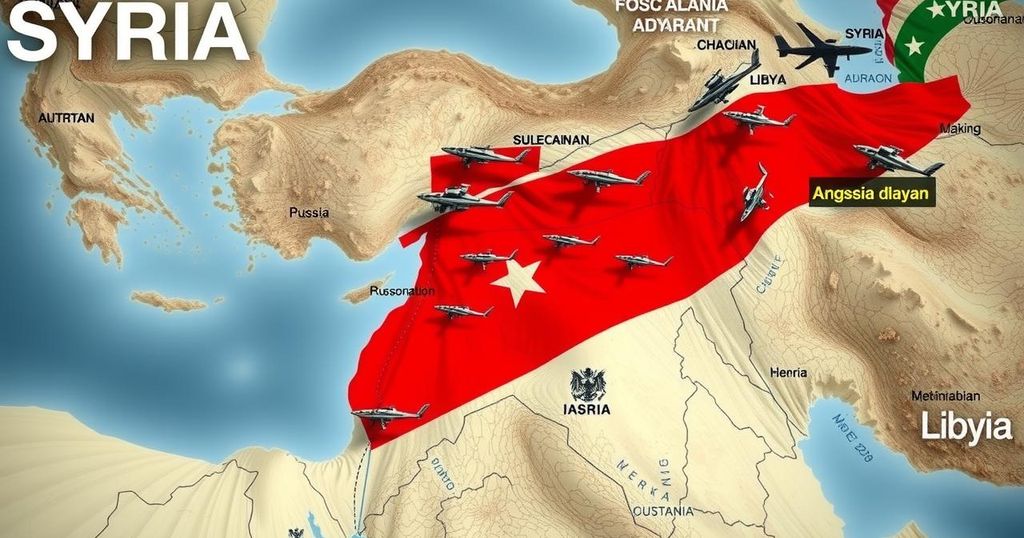World news
AFRICA, AFRICA CORPS, AL, AL - ASSAD, ASIA, BASHA, BASHAR AL - ASSAD, EUROPE/ASIA, GEOPOLITICS, HAYAT TAHRIR AL - SHAM, INTERNATIONAL CRISIS GROUP, LIBYA, MILITARY, NATO, OLEG IGNATOV, RUSSIA, RUSSIAN INVASION OF UKRAINE, SYRIA, TRIPOLI, US PRESIDENTIAL RACE, WAGNER GROUP, WAR
Ethan Kim
0 Comments
Russia’s Strategic Shift: Implications of Military Redeployment to Libya
Analysts debate Russia’s potential military shift from Syria to Libya, examining the implications for geopolitical influence and regional stability. With critical bases in Syria at risk, Libya is seen as a viable alternative for projecting power. However, internal division and the role of Khalifa Haftar complicate the situation, suggesting that increased Russian involvement may fundamentally alter Libya’s political landscape.
Recent analyses indicate that Russia may consider shifting some of its military focus from Syria to Libya, a move that carries significant implications for its influence in both regions. Although the consensus among experts suggests that Russia would sustain minimal material losses from a hypothetical departure from Syria, the Kremlin’s strategic interests in maintaining its presence across the Mediterranean and North Africa remain robust. Over the past decade, Russia has cultivated its military and diplomatic foothold in these regions, contributing to discussions regarding its next possible moves following potential shifts in Syria’s power dynamics.
During the Syrian conflict, Russia established substantial military assets, including the Khmeimim airbase and an expanded naval base at Tartous, which serves as its only warm-water port. The uncertain future of these bases raises questions about the Kremlin’s operational capacity. With expectations of reduced military assets in Syria, Libya emerges as a viable alternative, particularly given Russia’s existing presence and ambitions in the North African state. Analysts project that a significant Russian military escalation in Libya could provoke further instability in an already volatile environment.
Maintaining a strategic foothold in Libya would not only bolster Russia’s military positioning but would also enhance its capacity for influence within North Africa and potentially against NATO’s southern borders. Experts highlight Libya as an essential asset for Russia, describing it as unique for its geographical advantage that allows for the projection of power into Europe. However, significant developments are not observed on the ground in Libya at this time, with satellite imagery showing no new military construction or expansions at Russian-controlled facilities.
Simultaneously, Libya navigates its internal political crises, characterized by competing governments. The Government of National Stability, led by Khalifa Haftar, continues to vie for power against the internationally recognized Government of National Accord. The potential reinforcement of Haftar’s position through an influx of Russian military support could severely complicate already fragile negotiations aimed at resolving the country’s political deadlock. Analysts argue that such a military establishment would enhance Haftar’s leverage drastically, positioning him to dictate terms in peace negotiations that could ultimately undermine wider diplomatic efforts.
As Western powers seek to engage with Haftar, leveraging his strategic importance, they must confront the reality that he has become increasingly aligned with Russian interests. With Russian support, Haftar has transformed into a political actor responsive to Kremlin directives rather than Western diplomatic overtures. Hence, the ongoing geopolitical maneuvering in Libya signifies a complex interplay between competing international interests, border security, and regional stability.
The article analyzes the strategic implications of Russia potentially redeploying military assets from Syria to Libya amidst changing power dynamics in both countries. Historically, Russia has established significant military presence in Syria to support the regime of Bashar al-Assad, thereby ensuring access to critical military bases. However, with the geopolitical landscape in Syria evolving, the necessity for alternative bases in Libya becomes crucial for Russia to maintain its regional influence. As Libya remains embroiled in a power struggle between rival governments, the introduction of Russian military support could further complicate the intricate political situation, impacting regional security and diplomatic relations with Western powers.
In conclusion, discussions surrounding the possibility of Russian military realignment from Syria to Libya underline significant geopolitical ramifications for both nations and the wider Mediterranean region. While the Kremlin’s objective remains to uphold its influence amid shifting power structures, the prospect of enhancing military capabilities in Libya raises critical concerns over regional stability and international diplomatic negotiations. The intricate dynamics involving local power players, coupled with Russian ambitions, portray a complex narrative that warrants close scrutiny by analysts and policymakers alike.
Original Source: www.aljazeera.com




Post Comment